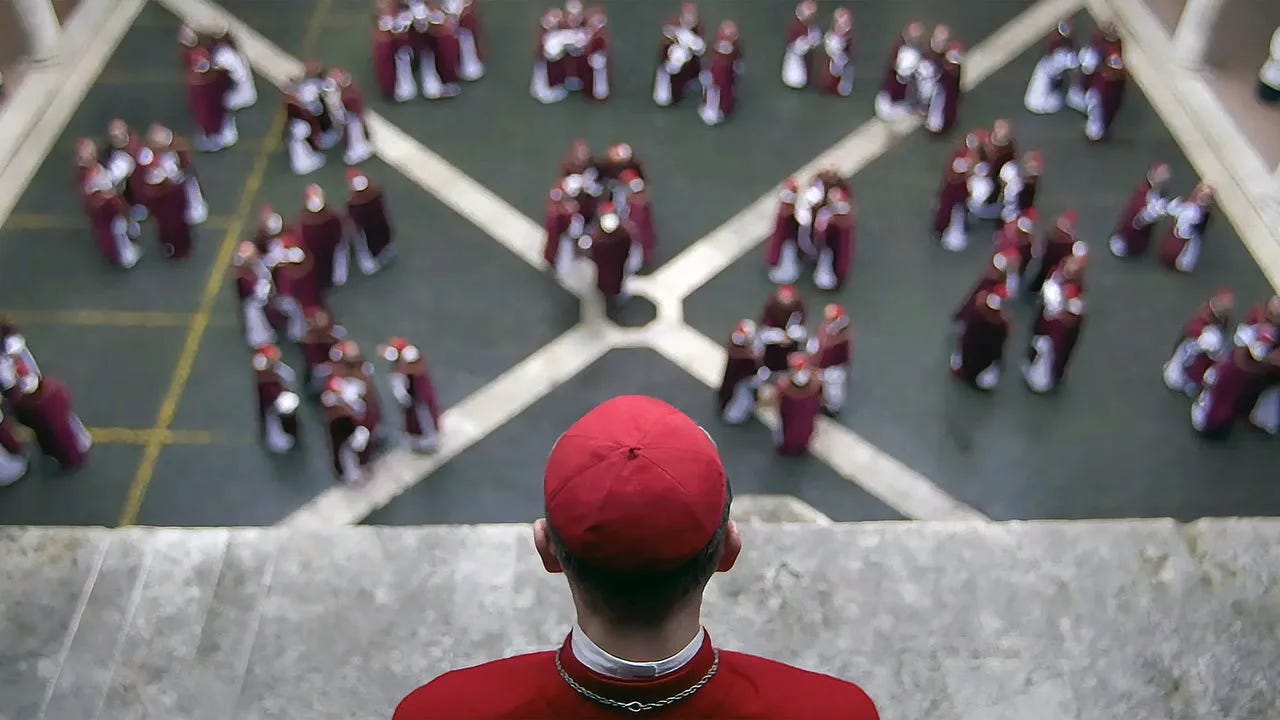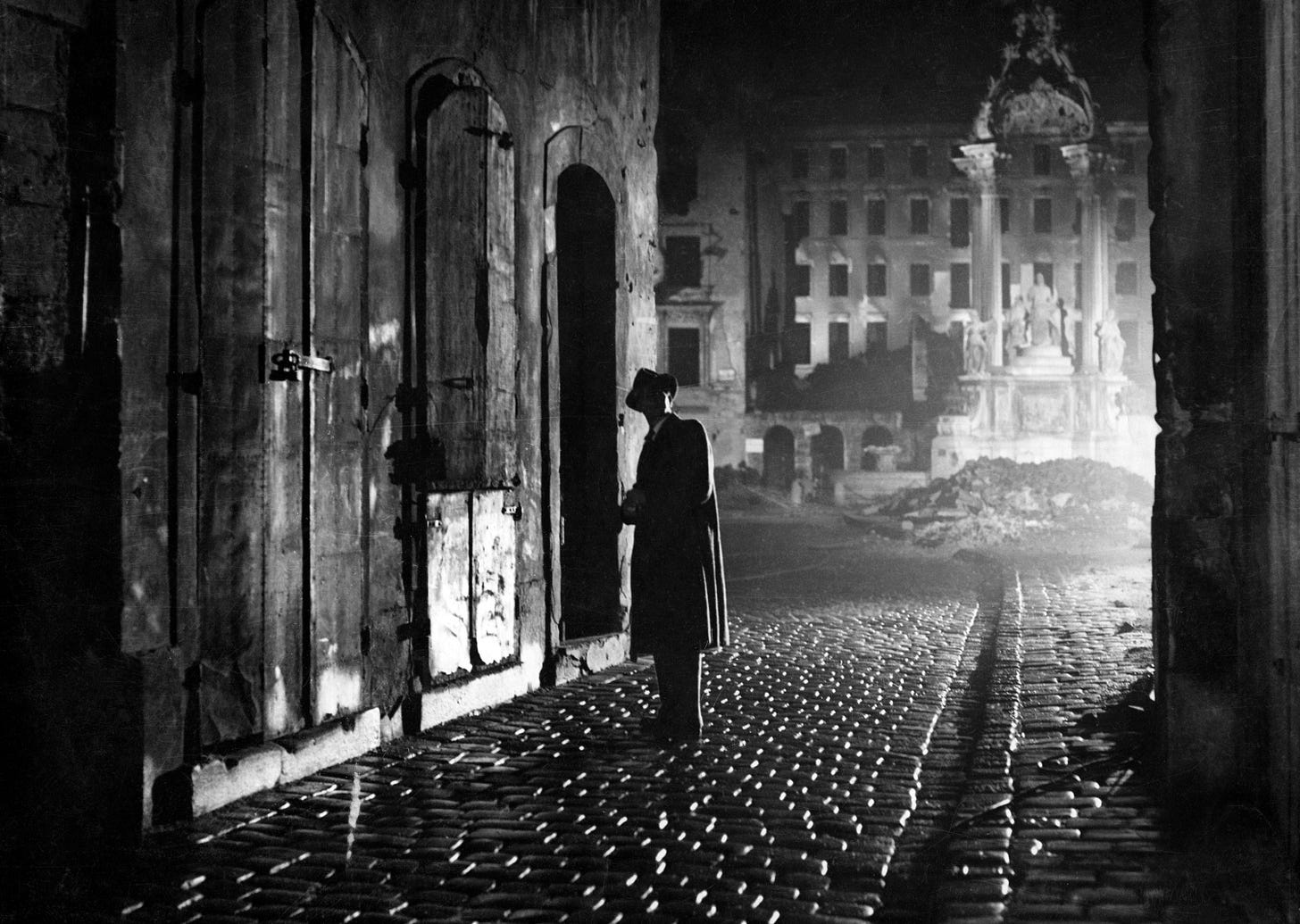Three recs, found family edition
A political thriller in the Vatican, my fave comedy special(s), a Vienna-set post-war noir
I met my new niece for the first time last weekend! She’s three weeks old and basically a very cute and cuddly blob, and it was nice to be able to hold her until she started screaming and then hand her back to her parents.
What makes someone family? My niece and I are not biologically related. Her mother is my husband’s sister. We get along well, but we both have friends we are far closer to than each other. Indeed, my best friends’ kids are also my nieces and nephews. How could they not be? Their parents are like family to me, and they are extensions of their parents.
Or are they? Am I an extension of my parents? I know a handful of you readers are my parents’ friends, and I am embarrassed to admit that it took until my friends started having kids to fully understand our relationship. I didn’t realize, until then, that you love me because you love them. That you were always going to care about me. That it was up to me to reciprocate.
There’s a lot of talk about ‘found family’ these days. As someone who lives halfway around the world from most of her biological relatives, I am a walking advertisement for it. And it often makes me wonder about the relationships we’re meant to prioritize.
For example: I moved to London because of my husband. There’s no way around that. He’s British, I’m American, he’d already lived in the US, it was, for all intents and purposes, my turn to move countries. We can talk about my qualms around making a huge life decision for someone else another time. The point is, it’s socially acceptable to move for a romantic partnership. It’s also socially acceptable to move to be closer to your biological family. It’s even socially acceptable to move for a job.
But what if I wanted to move to be closer to one of my best friends? If all your friends live in one place, that’s one thing. But I would no doubt get at least a few curious looks if I told someone I was upending my life and moving halfway around the world because I had a friend there. And yet, if they’re a friend who’s like family, it should be no more unusual than moving somewhere because you have family there, or because your romantic partner is there.
Is it the fear that, because there is no blood tie, that relationship could end? But so could a marriage. Siblings could become estranged. Every relationship is a risk. Every relationship ebbs and flows. We want security, and so we build hierarchies into our relationships. We want to know that someone will be there for us when we call, that we won’t be alone. But I wonder if sometimes we are so scared to take a risk on people who are not tied to us through blood or marriage that we inadvertently keep people from loving us as much as they want to.
And so, what makes someone family? I guess my niece is stuck with me for the rest of her life, whether she likes it or not. But I hope she also finds friends that she would willingly shape her life around, with whom she’ll choose to be stuck for better or worse. And I hope, too, that my friends’ kids know I love them like family, if they’ll let me.
And now, onto the recs!
Rec 1
Conclave (film)
Tis the season of Oscar bait. As November rolls around and these heavy-hitter films come out, we all wonder: Is it actually good, or does it just have beautiful cinematography and a flashy cast in search of awards?
In the case of this adaptation of a Robert Harris novel about the selection of a new pope, it does have absolutely breathtaking cinematography (the DP also did Jackie and A Prophet, and the director also did the exceptional All Quiet on the Western Front) and a truly top-tier cast (Ralph Fiennes! Stanley Tucci! Isabella Rossellini! John Lithgow!). But it’s also really fucking good. Who knew that a tense political thriller about choosing a new pope would be the perfect vehicle for an examination of power and democracy? (Everyone who thought about it, probably, but shh.)
Look, I spent a lot of my education in Catholic schools, so I both know a lot about the Catholic church and harbor a complicated antipathy toward it. Simultaneously, I find its history, pageantry, and inherent paradoxes fascinating. I also love its ridiculously opulent aesthetic. How can you not? So, I was probably always going to be in the target audience for this film. That said, the number of people I’ve spoken to who went in expecting to find it boring, or who neither know nor care much about the Catholic church, or just really didn’t think it would be for them – the number of these people who found themselves riveted and came out enthusing about it should be enough to tell you that Conclave does what every good story should:
It tells a very specific story, and, in doing so, tells a universal one.
One last thing: This is not really a film about Catholicism (though it does showcase both the best and worst of any religion, really). It is, however, a film about believing in something, and about not knowing what you believe in. It’s about picking sides and not picking sides. It’s about how life is uncertain, and how everything we think we know and believe can be wrong.
It’s also just very entertaining. Which is what we really want, right?
Where: In cinemas now
Rec 2
Repertoire + Cold Lasagne Hate Myself 1999 + Hecklers Welcome (comedy specials)
I’ve never recommended a comedy special before. Because, honestly, I don’t watch that much stand-up comedy. I don’t dislike it, it’s just not something I ever feel compelled to watch.
There is one exception to that rule, and it’s British comedian James Acaster.
The first time my husband put on Acaster’s 2018 four-part Netflix special, Repertoire, I was so uninterested. Five minutes in, I was reluctantly chuckling to myself. Ten minutes in, there was nothing reluctant about my laughter. By the end of the first part, I was pressing play on the second one. Which of course meant that, when his next special, Cold Lasagne Hate Myself 1999, came out in 2020, I was fully on board. And yet, still, that one blew me away. If Repertoire was great, Cold Lasagne was excellent. Imagine my delight, then, when I discovered last weekend that Acaster had literally just released his newest special, Hecklers Welcome, this time with HBO. Which is how you’re ending up with a 6-for-1 rec here.
What makes Acaster so good? Honestly, he’s one of the smartest comedians I’ve ever encountered. To be fair, he’s probably one of the smartest storytellers I’ve encountered, since that’s what stand-ups are doing – they’re just often telling stories about some of the darkest and most personal moments in their lives. At least, that’s the kind of comedy Acaster does. He bares his soul and opens up about his mental health, his bad behavior, his traumas and his fears. In other words, he’s the butt of most of his jokes. It’s all incredibly millennial of him – I have no idea if his comedy transcends generations, sorry.
So you have a sense of what you’re getting into: Repertoire is perhaps the least personal of the specials, with him creating personas and call-backs throughout the four episodes. Cold Lasagne, on the other hand, sees him digging into some of the worst experiences of his life, all for our amusement, in a truly impressive two hour piece. Hecklers Welcome sees Acaster tackling his needs for both attention and control by opening up the room to harassment even as he examines the experiences that contributed to making him the way he is.
Honestly? It’s insightful, but it’s also all just really funny. It’s nice to be able to laugh at ourselves.
Where: Netflix, Vimeo, and HBO/Max/Sky (respectively)
Rec 3
The Third Man (film)
Deep cut here, but I recently had the opportunity to watch this classic 1949 Graham Greene/Carol Reed noir – also one of my favorite films – on 35mm in a cinema, and it reminded me that I can recommend old movies here, too.
The set-up: Struggling American pulp novelist Holly Martins shows up in post-war Vienna in search of a childhood friend who’s promised him a job. Vienna is a literal ruin, still divided among the Allied powers even as the real power is held by those who run the black market. Martins discovers that his friend has just died in a tragic car accident – but he quickly suspects that there’s something else going on, and sets out to find the truth. Like any good noir, no one is quite who they seem and morality is less clear-cut than a pulp writer like Martins would prefer.
If you’ve ever read a Graham Greene novel, you know to expect an excellently twisty and propulsive mystery. If you’ve ever seen a noir, you know to expect stunning black-and-white cinematography that plays with perception and reality. And if you’ve ever seen Orson Welles in anything, you know to expect a performance that will steal scenes from a number of other excellent actors. Sure, the one female character deserves better, but, despite the best efforts of the men around her, she refuses to be a damsel in distress.
It’s also really cool to get to see post-war Vienna – most of the film was shot on location in 1948, as the former imperial capital was still picking up the pieces after having been decimated.
Without giving away too much for those who’ve never seen, this rewatch had me thinking about how similar the villain is to many of the rich assholes we’re dealing with today. People who are out for their own enrichment, no matter who it hurts. Except, the guys these days don’t even have the excuse of having been through the trauma of war.
Anyway, I can’t recommend highly enough seeing this one on the big screen and on film. It honestly made a great movie even better.
Where: I suggest looking up screenings at your local cinemas!
That’s all for this week! What are you reading/watching/listening to that I should be aware of? Drop me a line (or comment) to let me know if you check out any of my recs and what you think.
Please spread the word and I’ll see you in a couple weeks.
xo
Kate
Did someone share this with you?






